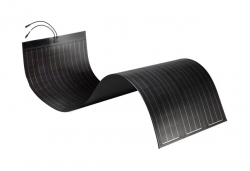
An image of SoloPower's flexible PV module. | Photo Courtesy of SoloPower
50 years ago today John F. Kennedy delivered his "MoonShot" speech, saying America would land a man on the moon before the end of the 1960s. Marking the anniversary, Vice President Biden delivered a speech in Boston this afternoon laying out the case for federal investment to ensure our country continues to lead the world in technology and innovation.
"Think about it," he said. "We believe we can be generating 80% of America’s electricity from clean sources by 2035. And we've called for what we refer to as a "SunShot" to make solar energy as affordable as traditional forms of energy. What if, in the pursuit of that goal, we develop new technologies that make renewable energy cheaper than coal? Think about how that would change our energy future."
Every day, scientists and researchers are developing the technologies to make that goal a reality. Today's post from Minh Le, the Chief Engineer in the Office of Energy Efficiency and Renewable Energy' s Solar Energy Technologies Program highlights a company that, with the aid of federal investment, is making remarkable advancements in photovoltaic (PV) solar systems -- advances that help increase the efficiency and reduce the cost of this game-changing technology of our future.
Flexible Thin Film PV Manufacturer Rolls Out Innovative Modules
When most people think of photovoltaic (PV) solar systems, it's more than likely they imagine the rectangular, glass panels that people around the world have come to associate with solar power. SoloPower is one of the companies challenging us to think outside of the box, building on advances made while the company participated in the Department of Energy’s PV Technology Incubator to manufacture flexible, thin-film Copper Indium Gallium (di)Selenide (CIGS) PV modules that are lightweight and easy to install. The company's modules can be rolled out much like you would roll out a carpet, offsetting the cost of mounting structures used to install glass panel PV systems.
The company's innovative PV technology -- a proprietary electroplating process that coats a flexible metal foil with a thin layer of CIGS semiconductor material -- received funding and technical support from the PV Incubator while SoloPower was a start-up. The PV Incubator supported SoloPower’s R&D activities with a $2.4M award and by providing access to the facilities and expertise of the folks at the National Renewable Energy Lab (NREL).
The company was able to make significant advances over the course of its 18 month engagement with the PV Incubator, scaling-up its pilot-scale electroplating CIGS process and demonstrating 1 square meter modules with 10 percent conversion efficiencies. Over the same period, SoloPower tripled the size of its workforce, shifted manufacturing from a small R&D laboratory to an 110,000 square foot manufacturing facility and scaled-up the technology used to process the modules’ metal foil substrate.
SoloPower’s current modules are able to achieve an NREL-confirmed 12.1 percent peak conversion efficiency. Unlike glass PV modules that require specialized mounting structures, SoloPower’s flexible PV modules can simply be rolled out onto the surface where they are being applied. This offsets materials costs associated with solar installations, reducing costs ultimately borne by consumers, and makes the modules particularly useful on rooftops.
A $197M loan guarantee -- conditionally extended by the Department’s Loan Programs Office in February 2011 -- will allow the company to place several manufacturing lines inside of a previously vacant warehouse in Wilsonville, Oregon. The factory is expected to create 500 permanent jobs and 270 construction jobs, and, at full capacity, is expected to produce 400MW of PV panels each year, enough to achieve annual carbon dioxide reductions equivalent to taking about 79,000 vehicles off the road each year.
SoloPower's participation in the PV Technology Incubator is proof positive of how the Department is investing wisely in innovative solar technologies that are creating solar manufacturing jobs here at home and helping us achieve the SunShot Initiative’s goals for low cost solar energy by the end of the decade.


